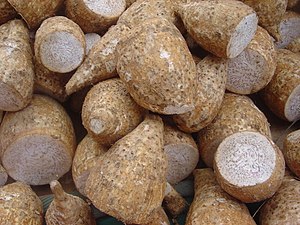Corm
short, vertical, swollen underground plant stem that serves as a storage organ
A corm is a modified plant stem some plants use as a storage organ or for hibernation. [1] Corms are structurally plant stems, and can produce roots. On the top of the corm, one or a few buds grow into shoots that produce normal leaves and flowers.

Some plants with corms regularly replace their older corms with a stack of younger ones. In other species their corms simply grow larger in most seasons. Yet others split when multiple buds or stolons on a large corm sprout independently.
Corms can be dug up and used to multiply or redistribute the plant (see, for example, taro). Plants with corms generally can be propagated by cutting the corms into sections and replanting.
Examples
changePlants that form corms include the following species:
- Alismataceae
- Sagittaria spp. (arrowhead or wapatoo)
- Araceae
- Alocasia macrorrhizos (giant taro)
- Amorphophallus paeoniifolius (elephant foot yam)
- Arisaema
- Colocasia esculenta (taro)
- Cyrtosperma merkusii (giant swarm taro)
- Xanthosoma (malanga, cocoyam, tannia, and other names)
- Asparagaceae
- Asteraceae
- Colchicaceae
- Cyperaceae
- Eleocharis dulcis (Chinese water chestnut)
- Iridaceae
- Musaceae
References
change- ↑ "corm | Description, Functions, & Examples". Encyclopedia Britannica. Retrieved 2020-09-20.
- ↑ "Musa in Flora of North America @ efloras.org". www.efloras.org. Archived from the original on 24 May 2005. Retrieved 8 April 2018.